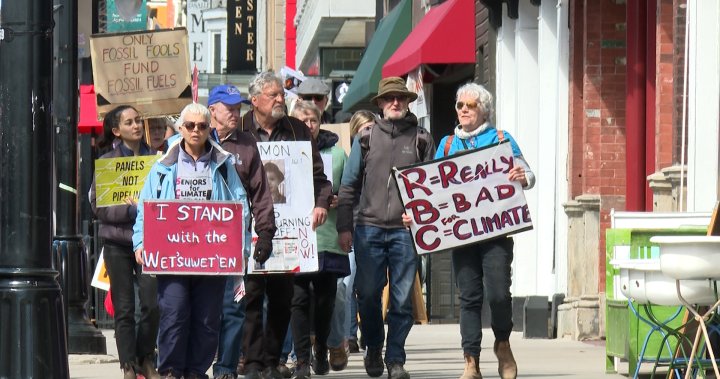Members of Seniors for Climate Action Now gathered in front of a Royal Bank of Canada branch in Kingston, Ontario for the second year in a row to protest the financial institution’s investments in fossil fuels. In the last year, SCAN partnered with local climate action groups to divest over $3 million of their own money from RBC to send a message. This action has led to RBC announcing that they will bring forward a motion in their annual general meeting to uphold prior informed consent, which is crucial in the Wet’suwet’en people’s battle in British Columbia against the Coastal Gaslink pipeline. SCAN’s mandate is to motivate seniors to take action, and they credit the support of younger individuals from Queen’s University and local high schools for their successful protest.
Seniors for Climate Action Now recognizes the importance of multi-generational efforts in the fight against climate change. High school student Abbie Miolee, who started the LaSalle Secondary School Earth Club, highlights the invaluable help and guidance she has received from older climate activists in Kingston. She emphasizes the need for both young and older generations to come together to address the climate crisis. Miolee expresses her desire to live off the land and sustainably, but she feels that without real action on climate change, this goal is becoming increasingly difficult to achieve. The protesters are advocating for renewable energy sources like wind and solar power as alternatives to fossil fuels, emphasizing the urgency of transitioning to clean energy.
The collaboration between young activists and seniors has been instrumental in organizing the protest against RBC’s investments in fossil fuels. Nancy Nicol, a member of SCAN, praises the energy, skills, knowledge, and abilities that the younger generation has brought to the cause. She underscores the importance of their support in successfully challenging a major Canadian bank. Organizing protests across the country, the group aims to raise awareness about the need for sustainable energy solutions. The focus is on promoting renewable power sources such as solar and wind energy over fossil fuels. By advocating for “panels instead of pipelines,” the protesters emphasize the urgency of transitioning towards cleaner energy options to combat climate change.
The protest in front of the Royal Bank of Canada branch in Kingston is part of a larger movement involving around 40 protests across the country. The annual general meeting of RBC is scheduled for April 11 in Toronto, where the motion to uphold prior informed consent will be discussed. The protesters are determined to continue their advocacy for sustainable energy and divestment from fossil fuels. This collective action reflects a growing grassroots movement that spans different generations and communities, demonstrating a unified effort towards addressing the climate crisis. By mobilizing people of all ages and backgrounds, the protesters are sending a strong message to financial institutions and policymakers about the urgency of transitioning towards renewable energy and taking meaningful steps to combat climate change.
The collaboration between SCAN, local climate action groups, young activists, and seniors in Kingston exemplifies the power of collective action in advocating for climate justice. By divesting millions of dollars from RBC and advocating for renewable energy solutions, the protesters are making a significant impact on raising awareness about the detrimental effects of fossil fuel investments. The emphasis on multi-generational collaboration underscores the importance of intergenerational solidarity in addressing the pressing issue of climate change. As the protest movement continues to gain momentum across the country, the protesters remain committed to pushing for sustainable energy alternatives and holding financial institutions accountable for their role in fueling the climate crisis. The efforts of groups like Seniors for Climate Action Now highlight the importance of grassroots activism in driving meaningful change towards a more sustainable and environmentally conscious future.


